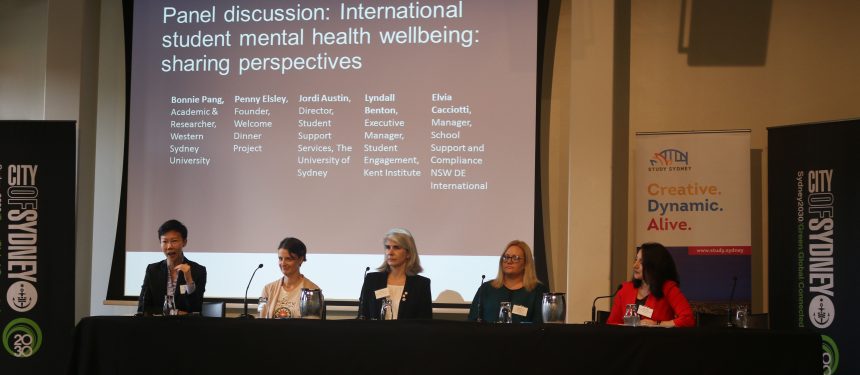Educators were reminded of their role in ensuring international students’ wellbeing remains high while in Australia, during the International Education Providers Forum in Sydney last month.
News and business analysis for Professionals in International Education
Have some pie!
Understanding success could improve student wellbeing
 Dr Bonnie Pang, Penny Elsey, Jordi Austin, Lyndall Benton and Elvia Cacciotti at the 2017 International Education Provider Forum. Photo: The PIE
Dr Bonnie Pang, Penny Elsey, Jordi Austin, Lyndall Benton and Elvia Cacciotti at the 2017 International Education Provider Forum. Photo: The PIE The summit, hosted by StudyNSW, the City of Sydney and the NSW Police Force, called on institution representatives from New South Wales to better understand students’ definitions of success to maintain their wellbeing.
“For students, [success] might be navigating Sydney’s public transport and turning up in the morning for class”
“Parents, when they send their sons and daughters from overseas, expect us to look after them. Well, what does that mean?” University of Sydney student support services director Jordi Austin asked delegates.
“What do students want when they come to our shores? We need to think about what it is that someone is doing when they’re putting their life on hold… to come and study with us.”
According to Austin, there is a significant gap between what institutions and students consider to be a successful study experience.
“No student dreams of attending university to be retained… Retention is an institutional marker of success; it is not a student marker of success,” she said, reflecting on providers’ tendency to use continuation and completion rates to determine their performance.
“For one student, a high distinction in their course is their only mark for success. For other students, it might be navigating Sydney’s public transport and turning up in the morning for class. We have to be open to that and what they want success to mean for them.”
Ensuring parents understood their children’s motivations for studying abroad and that they weren’t forcing them into studying in a particular country or course was also needed, according to Elvia Cacciotti, school support and compliance manager at the NSW Department of Education International.
“This global citizenship notion of studying abroad… is really changing the face of how students have to accept coming abroad as well,” she said.
“We’ve seen issues of students wanting to go missing because they’ve spent all their money or they’ve given their money to somebody… There’s shame about being vulnerable”
“They see it as exciting. They see it as maybe getting away from what they don’t want, [but] they don’t often verbalise. They are compliant in the sense they do what they’re told.”
Cacciotti added that providers needed to strike a balance between monitoring students’ social and emotional skills and intervening when necessary.
“If things break down really badly, then we have to consult with parents to ask is this the correct choice and maybe it is not viable for your son or daughter to continue,” she added.
According to a police delegate, the need to ensure overall wellbeing was tantamount, as not doing so often exacerbate international students’ vulnerabilities, and increased their chances of becoming victims and perpetrators of crime.
“We’ve seen cases of young girls who’ve fallen to sex slavery. We’ve seen issues of students wanting to go missing because they’ve spent all their money or they’ve given their money to somebody… There’s shame about being vulnerable,” the delegate said.
Throughout the summit, several delegates also noted the similarities between wellbeing concerns faced by local and international students, with Austin echoing sentiments from others that putting students into categories can be detrimental.
“Time and time again, international students will say to us: why are you still calling me an international student? I’m a student,” she said.
“We need to be very careful in our communication and recognising that students want to be seen as a member of our community.”
Use of terminologies, such as ‘wellbeing’ rather ‘mental health’ or ‘mental illness’, had a similar effect, Austin added.
New South Wales currently hosts Australia’s largest cohort of international students, representing 17% of the countries year to August enrolments.
Still looking? Find by category:



It is heartwarming to read this article and comforting to know that there are people who genuinely care about the well being of the students. These students, who are still young children; vulnerable and naive, trying to find their feet at the same time live up to the expectations of their loved ones. Their wellbeing can be nurtured if these students are provided with an opportunity to work with a coach whilst they are trying to assimilate and become a student. I have worked with students through various transition points such as moving from one country to another; secured a place in the university yet unsure of what they want to do because they are pursuing the dream of their loved ones. We at Coaching Element, specialize in helping students identify their strengths to find their objective and succeed in it. We coach them through their journey; when they need just a bit more support and are able to stand on their feet and say, I MADE IT!!